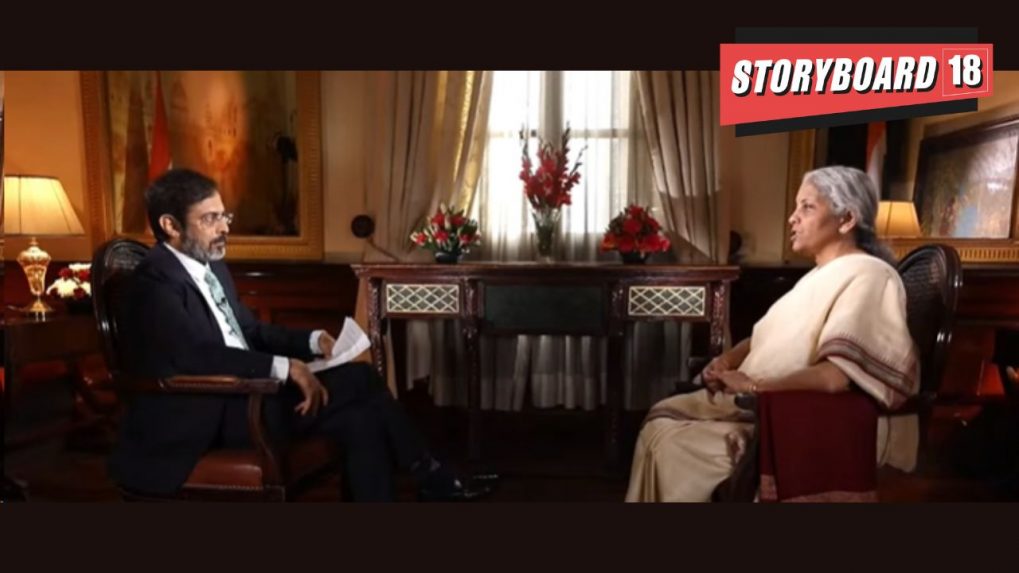FM Nirmala Sitharaman to Network18 Group's Rahul Joshi: “This is secularism in action"
Takeaways from Finance Minister Nirmala Sitharaman exclusive interview with Network18 Group Editor-in-Chief Rahul Joshi.
ADVERTISEMENT
A day after presenting the interim budget, Finance Minister Nirmala Sitharaman spoke exclusively to Network18 Group's Managing Director and Editor-in-Chief Rahul Joshi about how it was a “true vote on account budget”. Sitharaman presented the pre-election budget listing out achievements of the Modi government in the past 10 years while giving a glimpse of the future plans to make India a developed nation by 2047. While presenting the interim budget, Sitharaman said the Modi government covered all aspects of inclusivity. She added that the people of India are looking ahead to the future with hope and options. Structural reforms, pro-people programmes and employment opportunities helped the economy get new vigour.
“We treated it like a true vote on account, an interim budget before an election, and also an interim budget which is being presented with the clear understanding that the several programmes which were launched with empowerment of citizens in mind over the last 10 years are reaching the ground and the beneficiaries are already on their own speaking about it,” the FM said.
Read key takeaways from the exclusive interview.
“This is secularism in action"
In the exclusive interview, Finance Minister Nirmala Sitharaman told Network18 Editor-In-Chief, Rahul Joshi: “The power of word of mouth is very strong. So when a beneficiary gets truly the benefit, and without any middlemen playing a role in it, they really understand that the intent of the government is what they’ve said is what is getting executed. So I place a lot of trust in the word of mouth, which has helped in schemes like PM Awas Yogana, PM Mudra Yogana, Swanadhi Yogana. All of which have benefited the small households, small people who want to do their business and who don’t have money to give for collateral, no properties to give.
So this government has actually, because of the vision with which the prime minister is committed to serve this country, is actually serving the common people in letter and spirit, and that is recognized by the people themselves. It’s not as if you are saying and you are showing target numbers, you are showing achievement numbers. No, the people on the ground are saying about it, I’ve got it. And so has my neighbor. So has the neighbor of that household and so on.”
“That is why I have used an expression, and I mean it when I said it, that this is secularism in action. This is where we have not shown any difference between members belonging to this community or that, this religion or that or somebody’s relative or not. No difference. The project reaches the ground to everybody who deserves to get it. And if they are eligible, they get it irrespective of who they are. And therefore, in every way, the principle of empowerment, the Sabka Saath, Sabka Vishwas and Sabka Vikas, has been executed in every way. And that is the sense of confidence that the blessings of the people are not just at the time when we gave promises, but the blessings are coming in abundantly even now to say, yes, you’ve kept up your word,” the FM said.
"Impact of digitisation on rural economy yet to be measured"
The impacts of digitisation and connectivity on the rural economy are not coming through in current economic indicators, FM Nirmala Sitharaman said in the interview with Joshi, Editor-in-Chief, Network18 on February 2.
"Indicators with which we are looking at the rural economy may vary, newer indicators may tell us a different story. FMCG data is one indicator. But better connectivity, digitisation (in rural areas) are yet to be measured," said the Finance Minister a day after she presented the interim Budget. She also said that college recruitments, and hiring in top institutions like IIMs are important, but jobs created in middle and lower order are not being counted when talking about employment in the economy.
"I am not sure I will be able to describe what is happening in the rural economy. Let us recognise there is a lot of shift in employment, let us recognise migration is now looking at redefining itself," she further said.
"AI is forcing job seekers to develop new skill sets"
The FM spoke about the employment and job market in India. There has been news of students, and freshers not being able to find jobs despite being from the top institutions of the country like IITs and IIMs. According to Sitharaman, discussions on this topic are currently based on limited knowledge and information. There are more companies being registered in India and they obviously cannot operate in a vacuum. Furthermore, lower and middle order jobs are not being taken into account. "Why are companies being registered in higher numbers if jobs are not being offered?," said the FM.
The global slowdown is having an impact on Indian jobs as well, especially at the higher end in IIM’s and IIT’s. Sitharaman said, “because of artificial intelligence, the kind of job requirements expected of recruits is changing. People with old skillsets are expected to have new and additional sets of skills for entering a certain area which until now, didn’t exist.”

